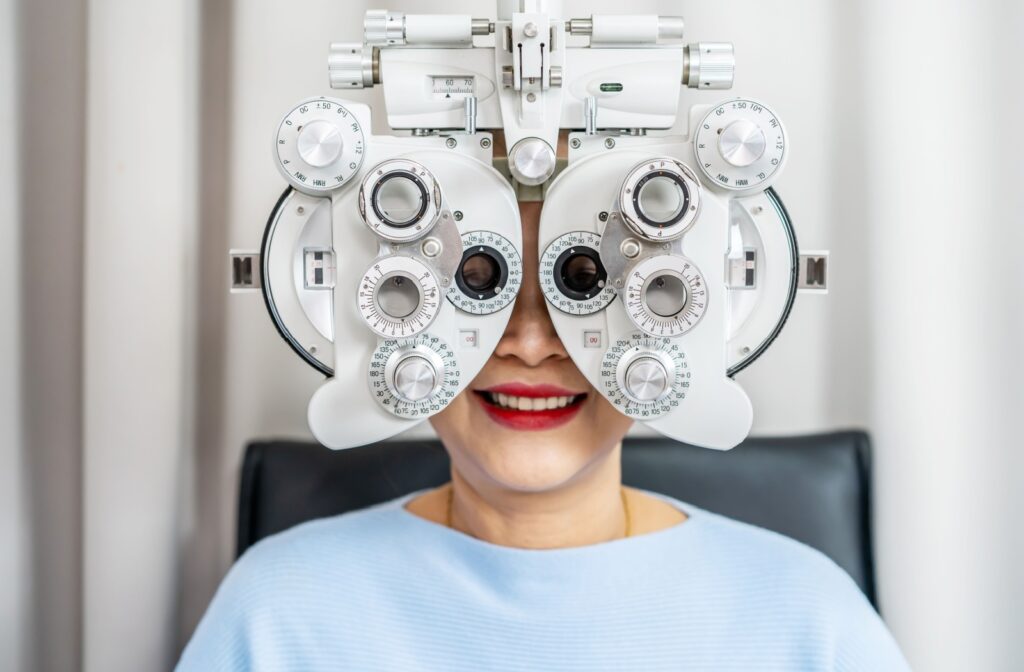Have you recently booked an eye exam and aren’t sure how to prepare? Don’t worry. Not much preparation is actually required for an eye exam, but there are a few things you can do and a few things you can avoid to get more out of the experience. If you have any questions or concerns, give your optometrist a call before the exam.
Before an eye exam, don’t forget to bring a list of your medications and be prepared to discuss your personal and family health history. This important information will help your optometrist deliver quality care. You should also bring your eyewear and, if you expect a dilated eye exam, sunglasses and transportation home.
Eye Exam Don’ts
Not much preparation is required for an eye exam, but some dos and don’ts can contribute to a good experience. Most importantly, bring a list of your medications, know your family and personal health history if possible, and bring your prescription eyewear.
Don’t Change Up Your Routine
Not wearing your glasses or contact lenses before your exam won’t “reset” your vision. Instead, go into the exam with your eyes in a state that’s close to your average, everyday vision situation. This means that, if you usually wear glasses, you should continue wearing them as usual.
Don’t Consume Alcohol
Hydration can affect the accuracy of your eye exam. Try to stay hydrated by drinking water, but limit your consumption of caffeine and alcohol. Drinking alcohol the night before may dilate blood vessels, affecting the accuracy of your eye exam. And while caffeine won’t dehydrate you in moderate doses, it’s best to stick with water as your main source of hydration.
Avoid Wearing Makeup
Take a break from eyeliner, eyeshadow, mascara, and other eye and skin products that are used near the eye on the day of your exam. Your optometrist may use eye drops for a dilated exam, and if these eye drops mix with beauty or skin care products, discomfort and irritation may result.
Eye exams may also involve equipment coming into contact with your face, which can cause smudging and other unwanted effects.
Don’t Rush the Appointment
Finally, take your time during your appointment. This is your time to ask questions and voice concerns. Better yet, bring a list of symptoms or concerns for you and your optometrist to discuss.

Eye Exam Do’s
Having thorough information about your family and personal health history can help your optometrist make an accurate diagnosis. You can also prepare for a dilated eye exam by bringing sunglasses and arranging a ride home.
Do Bring Your Eyewear
If you wear prescription eyewear, such as contact lenses or glasses, make sure you bring these to your exam. Your optometrist may want to examine them. It’s also a good idea to bring copies of previous prescriptions.
Do Bring a List of Medications
Bring a list of the medications you take, including prescription and over-the-counter medicines, vitamins, and supplements. Don’t exclude medications that seem unrelated to your eyes; your optometrist will benefit from knowing a full picture of your health. Knowing your family medical history also helps, as family history is a risk factor in some eye conditions.
Do Be Honest
Being open and honest with healthcare providers, including optometrists, is essential for receiving accurate and quality care.
According to the American Optometric Association (AOA), “The vast majority of optometry practices and doctors of optometry are covered entities and subject to HIPAA.” HIPAA is the Health Insurance Portability and Accountability Act, and it requires that medical providers protect their patients’ health information.
It’s natural and normal to be concerned about privacy, so give your optometry clinic a call to discuss privacy rules beforehand if you have questions or concerns.
Do Arrange a Ride Home if You’re Expecting a Dilated Eye Exam
A dilated eye exam involves instilling eye drops into the eyes to temporarily widen the pupils. It’s an important part of an eye exam and can help detect eye diseases early, before they show obvious symptoms.
This procedure may temporarily make you sensitive to light and affect your vision, so if you’re expecting one, be prepared. Bring a pair of sunglasses, arrange for a ride home, or be prepared to take public transit.
Do Get a Good Night’s Sleep
Eye strain and fatigue can affect an eye exam, so try to get a good night’s sleep the night before. Limiting your screen time and avoiding things that strain your eyes will also help.
Comprehensive Eye Exams in Loveland, OH
Regular comprehensive eye exams aren’t just for updating your eyewear prescription. They’re an important component of general health and well-being. That’s because many eye diseases don’t show obvious symptoms until they reach a more advanced stage. Regular eye exams can detect these diseases early, and earlier detection means earlier intervention.
Most adults ages 18 to 64 benefit from a routine eye exam every 2 years. Meanwhile, most school-aged children ages 6 to 17 should get their eyes checked once a year. You may need more frequent eye exams if you have certain risk factors. Ask your optometrist for their recommendation on eye exam frequency.
Owned and operated by Ohio locals, 2020 Eyecare Ohio is passionate about eye health. Each person’s eyes are different, and our team strives to build a relationship with each client because we value personalized eye care. To schedule your next eye exam, get in touch with us today.



